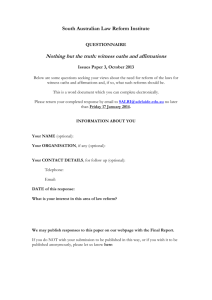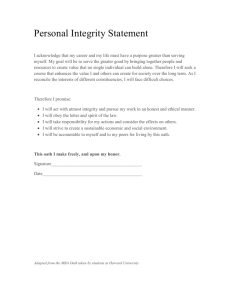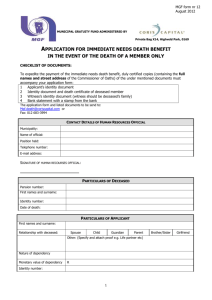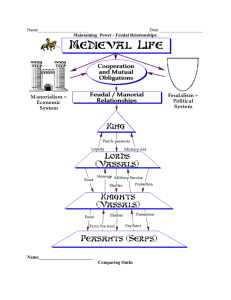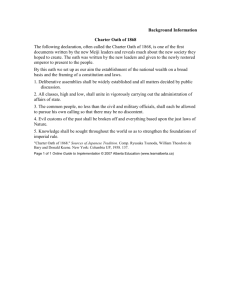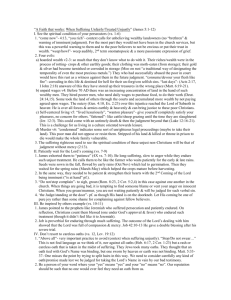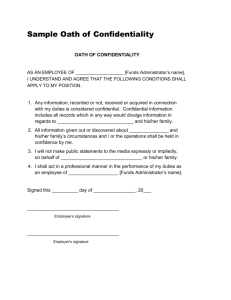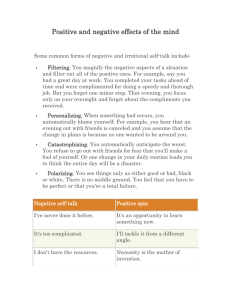the oaths act, 1873 - Government of Balochistan
advertisement
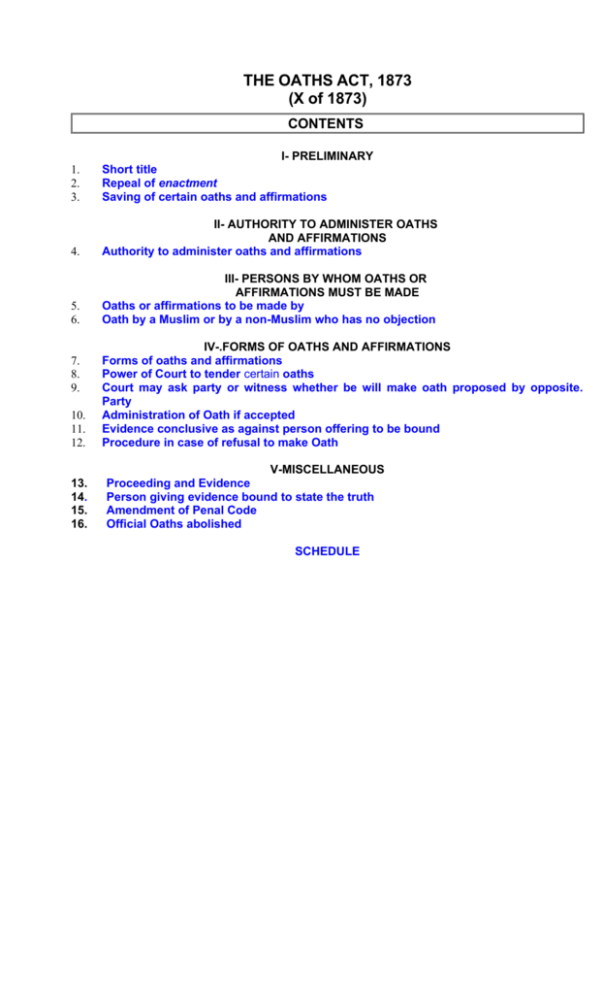
THE OATHS ACT, 1873 (X of 1873) CONTENTS I- PRELIMINARY 1. 2. 3. Short title Repeal of enactment Saving of certain oaths and affirmations 4. II- AUTHORITY TO ADMINISTER OATHS AND AFFIRMATIONS Authority to administer oaths and affirmations 5. 6. III- PERSONS BY WHOM OATHS OR AFFIRMATIONS MUST BE MADE Oaths or affirmations to be made by Oath by a Muslim or by a non-Muslim who has no objection 7. 8. 9. 10. 11. 12. 13. 14. 15. 16. IV-.FORMS OF OATHS AND AFFIRMATIONS Forms of oaths and affirmations Power of Court to tender certain oaths Court may ask party or witness whether be will make oath proposed by opposite. Party Administration of Oath if accepted Evidence conclusive as against person offering to be bound Procedure in case of refusal to make Oath V-MISCELLANEOUS Proceeding and Evidence Person giving evidence bound to state the truth Amendment of Penal Code Official Oaths abolished SCHEDULE TEXT THE OATHS ACT, 1873 (X of 1873) [18th April, 1873] An Act to consolidate the Law relating to Judicial Oaths, and for other purposes Preamble.— Whereas it is expedient to consolidate the aw relating to judicial oath, affirmations and declarations and to repeal the law relating to official oaths, affirmations and declarations. It is hereby enacted as follows:I- PRELIMINARY 1. Short title.— This Act may be called the 1[Oaths Act, [1873.]2 Local extent.— It extends to the whole of Pakistan. 3 x 2. x x x x Repeal of enactment.— [Repealed by The Repealing Act, XII of 1873.] 3. Saving of certain oaths and affirmations.— Nothing herein contained applies to proceedings before Courts-Martial, or to oaths, affirmations or declarations prescribed 4 by or under any law or President’s warrants or for the time being in force 5. II--AUTHORITY TO ADMINISTER OATHS AND AFFIRMATIONS 4. Authority to administer oaths and affirmations.— The following Courts and persons are authorized to administer, by themselves or by an officer empowered by them in this behalf, oaths and affirmations in discharge of the duties or in exercise of the powers imposed or conferred upon them respectively by law— (a) all Courts and persons having by law or consent of parties authority to receive evidence; (b) the Commanding Officer of any military, 6(naval) 7(or Air Force) station 8 (or ship) occupied by the Arms Forces of Pakistan, provided that the oath or affirmation is administrated within the limits of the Station or on the ship: 8 (Government) Provided-- (1) that the oath or affirmation be administered within the limits of the Station ; and (2) that the oath or affirmation be such as a Justice of the Peace is competent to administer in 9Pakistan. III.-PERSONS BY WHOM OATHS OR AFFIRMATIONS MUST BE MADE 5. Oaths or affirmations to be made by witnesses, interpreters; Jurors.— Oaths or affirmations shall be made by the following persons:-1 The word “Indian” omitted by G.G.O. of 1949, Sch Subs. ibid , Arts. 3(2) and 4 , for “the whole of British India “. The original words “subjects of her majesty. To the terrorities of Native Princes and States in alliance with her Majesty. “ were fist subs. by the A.O. 1937 and then amended by the Federal laws (revision and Declaration ) Act, 1951 (26 of 1951), s.4 and III Sch. To read as above. The Words “it stands to all the provinces and the Capital of the federation and so far as regards British subjects., to all acceding stated” were substituted by the present words by central laws status reforms Ord. 1960 (XXI of 1960) 3 Replead by the Repealing Act, 1876 (12 1876) 4 Words inserted by Indian Oaths (Amendment) Act, 1919 (6 of 1919), S.2, have now been substituted. 5 The words “or by Law which (no legislature or authority in British India has power to repeal)”, omitted by GGO 4 of 1940, Sch. The words “by or under any instruction under the Royal sign Manual of His Majesty” were subs. by the AO 1937, for under the provision of the Indian councils Act, 1861 the GG in C. has power to repeal”. Further, the words “by or under any laws President’s Warrants or for the time being in force”’ were substituted for the words “by or under any instruction under the royal sign Manual of his Majesty” by the Central Laws (Adaptation) Order I of 1961. 6 Ins. by the Amending Act, 1934 (35 of 1934) 7 Ins. by the Repealing and Amending Act, 1927 (10 of 1927). 8 Subs by A.O., 1961, Art 21 (w.e.f. 23rd March. 1956).. 9 Subs. by G.G.O. 4 of 1949, Arts. 3(2) and 4 for “British India”. The words “ the provinces and the Capital of the Federation” substitutes by Central Laws Statutes Reforms Ord. 1960 (XXI of 1960) 2 (a) Witnesses.. All witnesses, that is to say, all persons who may lawfully be examined, or give, or be required to give, evidence by or before any Court of person having by law or consent of parties authority to examine such persons or to receive evidence, (b) Interpreters.-- Interpreters of questions put to, and evidence given by witnesses; (c) [Omitted by the Federal laws (Revision ad Declaration) Ordinance, XXVII of 1981] 10 Provided that where the witness is a child under twelve years of age, and the Court or person having authority to examine such witness is of opinion that, though he understands the duty of speaking the truth; he does not understand the nature of an oath or affirmation, the foregoing provisions of this section and the provisions of Section 6 shall not apply to such witness, but in any such case the absence of an oath or affirmation shall not render inadmissible any evidence given by such witness nor the obligation of the witness to state the truth. Nothing herein contained shall render it lawful to administer, in a criminal proceeding, an oath or affirmation to the accused person, or necessary to administer to the official interpreter of any Court, after he has entered on the execution of the duties of his office, an oath or affirmation that he will faithfully discharging those duties. 6. Oath by a Muslim or by a non-Muslim who has no objection. .— (1) Where the witness or interpreters is a Muslim, he shall make an oath. (2) Where the witness or interpreter is not a Muslim, he shall make an oath or, if he has an objection to making an oath, an affirmation. IV-.FORMS OF OATHS AND AFFIRMATIONS 7. Forms of oaths and affirmations.— All oaths and affirmations made under Sections 5 shall be administered according to such forms as the High Court may from time to time prescribe. And until any such forms are prescribed by the High Court, such oaths and affirmations shall be administered according to the forms now in use. 11 x x x x x x x x x Explanation.- [Repealed by the Lower Burma Courts Act, VI of 1960, S. 48]. 8. Power of Court to tender certain oaths.— If any party to, or witness in, any judicial proceeding offers to give evidence on oath or solemn affirmation in any form common amongst, or held binding by persons of the race or persuasion to which he belongs and not repugnant to justice or decency and purporting to affect any third person the Court may, if it thinks fit, notwithstanding person, anything herein-before contained, tender such oath or affirmation is him. 9. Court may ask party or witness whether be will make oath proposed by opposite. Party.— If any party to any judicial proceeding offers to be bound by any such oath or solemn affirmation as is mentioned in Section 8, if such oath or affirmation is made by the other party to, or by any witness in, such proceedings, the court may, if it thinks fit, ask such party or witness, or cause him to be asked, whether or not he will make the oath or affirmation. Provided that no party or witness shall be compelled to attend personally in court solely for the purpose of answering such question. 10. Administration of Oath if accepted.— If such party or witness agrees to make such oath or affirmation, the Court may proceed to administer it, or, if it is of such a nature that it may be more conveniently made out of Court, thy Court may issue a commission to any person to administer it and authorized him to take the evidence of the person to be sworn, or affirmed and return it to the Court. 11. Evidence conclusive as against person offering to be bound.— The evidence so given shall, as against the person who offered to be bound as aforesaid, be conclusive to proof of the matter stated. 12. Procedure in case of refusal to make Oath.— If the party of witness refuses, to make the oath or solemn affirmation referred to in Section 8, he shall not be compelled to make it, but the Court shall record, as part of the proceeding, the nature of the court or affirmation purposed, the facts that he was asked whether he would make it and that he refused it, together with any reason which he may assign for his refusal. V- MISCELLANEOUS 10 11 Proviso inserted by Indian Oaths (Amendment) Act , 1939 (XXXIX of 1939) The Explanation to Section7, was rep by the lower Burma Courts Act (6 of 1900) S.48 and H Schedule. 13. Proceeding and evidence not invalidated by omission of oath or irregularity.— No omission to take any oath or make any affirmation, no substitution of any one for any other of them and no irregularity whatever in the form in which any one of them is administered, shall invalidate any proceeding or render inadmissible any evidence, whatever in or in respect of which such omission, substitution or irregularity took place, or shall affect the obligation of a witness to state the truth. 14. Person giving evidence bound to state the truth.— Every person giving evidence on any subject before any court or person hereby authorized to administer oath and affirmation shall be bound to state the truth on such subject. 15. Amendment of Penal Code, Sections 178 and 181.— [ Repealed by the Repealing and Amending Act I of 1938, S.2]. 16. Official Oaths abolished.— Subject to the provision of Sections 3 and 5, no person appointed to an office shall, before entering on the execution of the duties of his office, be required to make any oath, or to make or subscribed any affirmation or declaration whatever. SCHEDULE [See Section 2] [Repealed by the Repealing Act, 1873(12 of 1873)]
